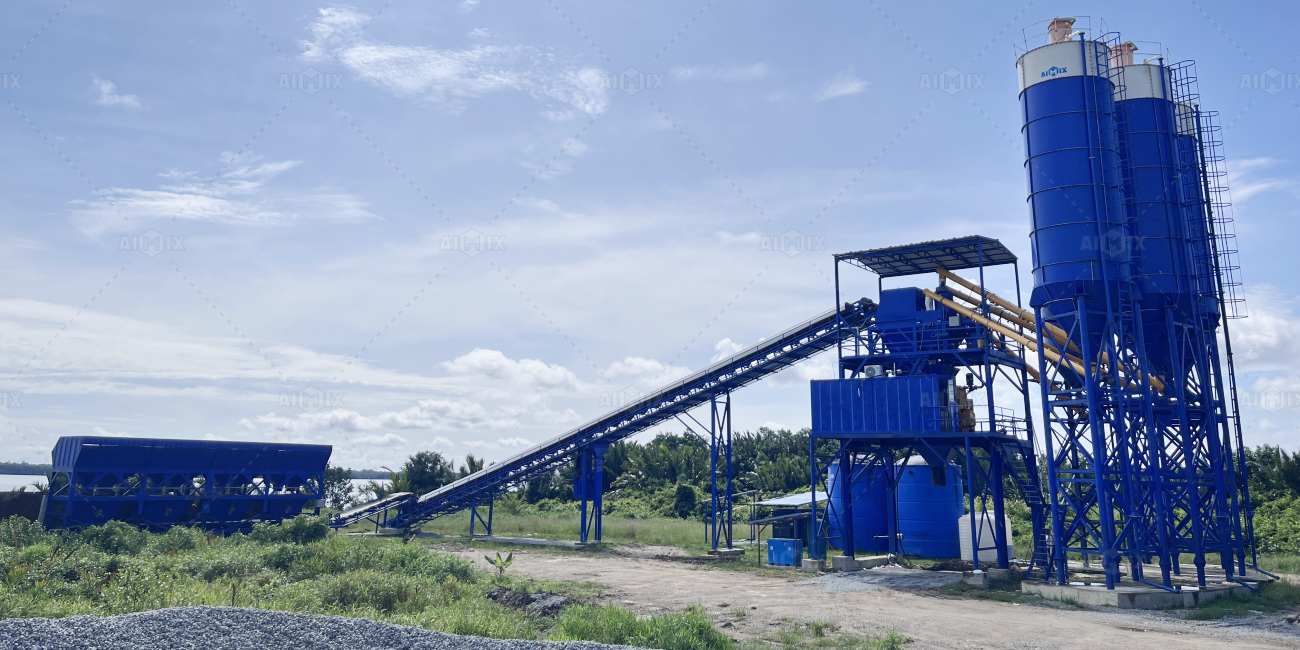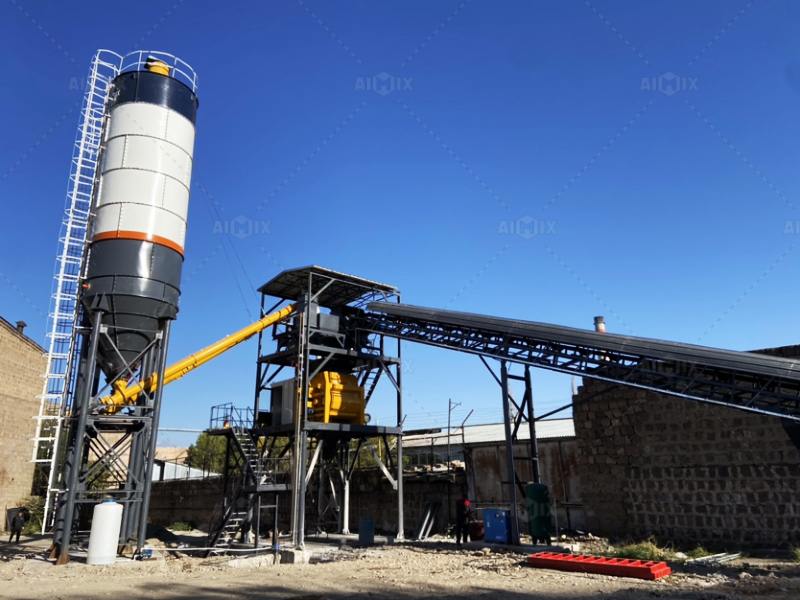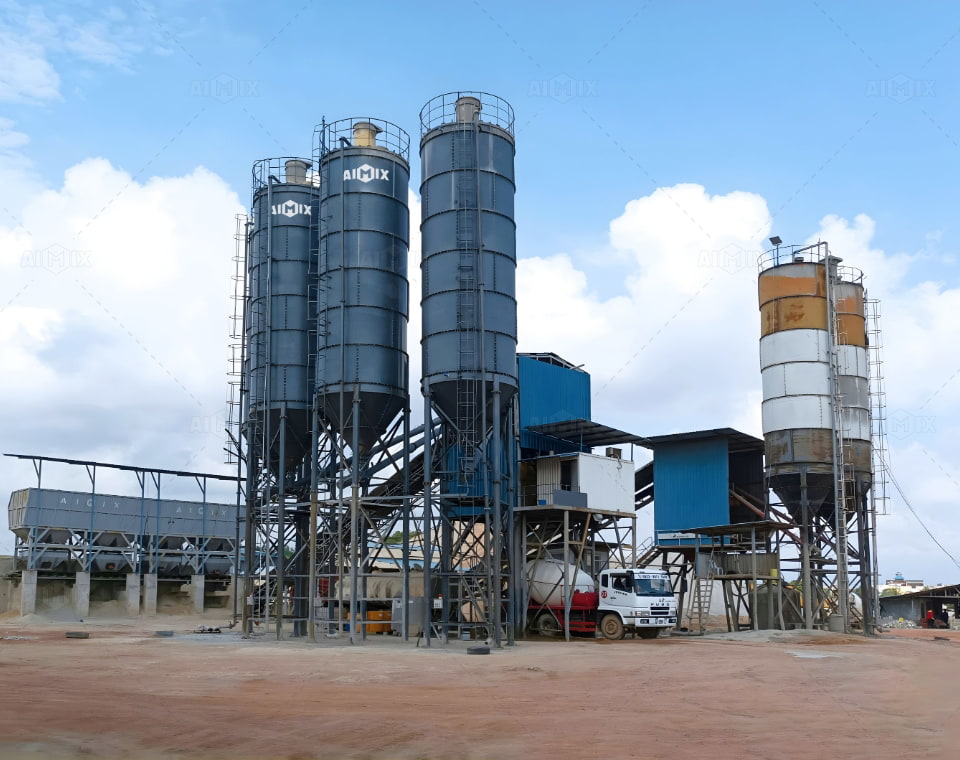In today’s fast-paced construction industry, efficiency and productivity are paramount. One of the most significant contributors to achieving these goals is the use of advanced stationary batching plants. These systems are at the core of high-volume concrete production, ensuring that projects are delivered on time and within budget. In this article, we will explore how advanced stationary batching plants enhance construction productivity, discuss their key features, and compare them with options like mobile batching plants for sale. We will also touch upon the role of concrete batching plant suppliers and answer the essential question: what is concrete plant?

What is Concrete Plant?
Before diving into the benefits of stationary batching plants, it is important to understand the basics. What is concrete plant? In simple terms, a concrete plant is an industrial facility that combines various ingredients such as cement, water, aggregates (sand, gravel, or crushed stone), and additives to produce concrete. This process, known as batching, ensures that concrete is mixed in the precise proportions required to achieve the desired strength and durability. There are different types of concrete plants available, including stationary, mobile, and compact systems. While each type serves a unique purpose, stationary batching plants are particularly renowned for their ability to support large-scale, high-volume construction projects.
The Advantages of Advanced Stationary Batching Plants
High Production Capacity and Efficiency
One of the primary reasons for selecting a stationary batching plant is its high production capacity. These plants are designed for continuous operation, often running 24/7 on major projects. Their robust systems can produce hundreds of cubic meters of concrete per hour, significantly reducing downtime and meeting the demanding schedules of large construction sites. Automation and advanced control systems further streamline operations, ensuring that each batch of concrete is produced with consistent quality.
Superior Quality Control
Advanced stationary batching plants come equipped with state-of-the-art control systems that monitor the mixing process in real time. This technology ensures that every batch of concrete adheres to strict quality standards. Precision in mixing leads to a more homogeneous product, which in turn results in concrete that performs better under stress, resists weathering, and has a longer lifespan. For construction projects where quality is non-negotiable, this level of control is invaluable.
Cost Efficiency and Reduced Wastage
While the initial investment in a stationary batching plant might be higher compared to other options, the long-term cost benefits are significant. High production rates, minimal downtime, and reduced material wastage contribute to lower overall operating costs. Additionally, the consistent quality of the concrete produced means fewer instances of rework and repair, leading to substantial savings over the lifespan of a construction project.
Reliability and Durability
Stationary batching plants are built to withstand the rigors of continuous operation. Their durable construction and robust components ensure long-term reliability, even in harsh operating conditions. This reliability is critical for large projects where delays can lead to significant financial losses.

Comparing Stationary Batching Plants with Mobile Batching Plants
While stationary batching plants are ideal for high-volume production, the construction industry also offers mobile batching plant for sale options. Mobile batching plants provide flexibility and are suitable for projects that require on-site concrete production in remote or temporary locations. However, they generally offer lower production capacities compared to their stationary counterparts.
For projects with high and continuous demand for concrete, stationary batching plants remain the preferred choice due to their efficiency, scalability, and lower long-term operating costs. On the other hand, mobile batching plants excel in versatility and rapid deployment, making them ideal for smaller or more geographically dispersed projects. Selecting between the two depends on the specific requirements of the construction project.
The Role of Concrete Batching Plant Suppliers
When investing in a stationary batching plant, choosing the right supplier is crucial. Concrete batching plant suppliers play a significant role in ensuring that you receive high-quality, reliable equipment that meets your operational needs. Here are some factors to consider when selecting a supplier:
Product Quality and Technology
Reputable suppliers offer plants that incorporate the latest technologies, including automation, remote monitoring, and energy-efficient components. These features not only improve productivity but also ensure that the plant operates reliably over a long service life.
After-Sales Support and Maintenance
A key component of your investment is the level of support you receive after the purchase. Leading concrete batching plant suppliers provide comprehensive after-sales services, including regular maintenance, technical support, and readily available spare parts. This support is essential to minimize downtime and keep your plant running smoothly.
Customization and Scalability
Different construction projects have varying needs. The best suppliers offer customization options to tailor the batching plant to your specific requirements, whether it is for a high-volume stationary system or a more versatile mobile unit. Scalability is also important; as your project demands grow, your batching plant should be able to accommodate increased production without requiring a complete system overhaul.

Enhancing Construction Productivity
By integrating advanced stationary batching plants into construction operations, companies can achieve significant gains in productivity. Here’s how:
- Streamlined Operations: Automation and real-time monitoring reduce manual intervention, minimizing human error and increasing production speeds.
- Consistency and Quality: Precise mixing ensures uniform concrete quality, reducing defects and rework.
- Cost Savings: Lower operational costs and reduced wastage translate into financial savings over the course of a project.
- Reliability: Durable and high-capacity systems ensure that construction timelines are met, even under continuous operation.
Investing in advanced stationary batching plants not only boosts productivity but also improves the overall quality and reliability of construction projects. When combined with the support of knowledgeable concrete batching plant suppliers, these systems become a cornerstone of modern construction operations.
Conclusion
Advanced stationary batching plants are transforming the way the construction industry operates. With their high production capacity, superior quality control, cost efficiency, and reliability, they represent the ideal solution for high-volume concrete production. While options like mobile batching plant for sale offer flexibility for smaller or remote projects, the stationary systems continue to dominate in large-scale construction scenarios.
Understanding what is concrete plant and the critical role it plays in modern construction is essential for making informed investment decisions. With the right support from experienced concrete batching plant suppliers, companies can enhance productivity, reduce operational costs, and deliver projects that meet the highest standards of quality. By embracing these advanced technologies, the construction industry is well-equipped to meet the challenges of the future and drive sustainable growth.